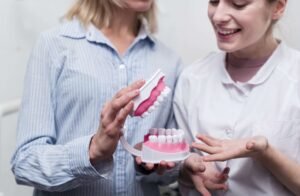Have you ever worried that your crown might loosen during a meal or an important meeting? You’re not alone. Crown stability is a top concern for patients—and the answer lies in permanent dental cement for crowns.
This adhesive is not just “glue”—it’s a scientifically engineered material designed to secure your crown, protect your tooth, and give you years of confident chewing.
If you’re just learning about crowns, start with our guide to dental crowns to understand the different types and why cement choice matters so much.
👉 Don’t let doubts about your restoration hold you back—let’s explore how permanent cements work, and why choosing the right one is key to a lasting smile.
Table of Contents
ToggleWhat Is Permanent Dental Cement for Crowns?
Permanent dental cement for crowns is a professional-grade adhesive applied in the clinic to bond your crown securely to your natural tooth.
Creates a durable seal against bacteria.
Provides strength to handle chewing forces.
Ensures a natural appearance with translucent formulas for front teeth.
Patients sometimes call it permanent dental glue for crowns, dental adhesive for crowns, or simply crown cement dental. Whatever the term, the goal is the same: a stable, long-lasting restoration.
How Does Dental Adhesive for Crowns Work?
The process may seem simple, but it’s based on years of science:
The dentist prepares the tooth and crown.
A thin layer of dental cement for crowns is applied.
The crown is placed, and the adhesive sets into a rock-solid seal.
The result? Your crown feels as natural and stable as your original tooth. Unlike quick DIY fixes, dental crown permanent cement is engineered for strength and reliability.
👉 Ready to secure your smile? Book your appointment at Kristal Clinic today and experience the lasting confidence of professionally placed crowns.
Get a free consultation
Types of Permanent Dental Cement for Crowns
Different formulas of dental cement for crowns—including resin, RMGI, and glass ionomer—are chosen based on durability, aesthetics, and patient needs.
Resin-Based Adhesives: Strongest option, ideal for zirconia crowns and all-ceramic restorations.
Resin-Modified Glass Ionomer (RMGI): Combines strength with fluoride release, excellent for PFM (porcelain fused to metal) crowns.
Glass Ionomer: Cost-effective and simple, often used for posterior crowns where aesthetics are less critical.
If you need a quick, short-term solution before applying a professional adhesive, check out crown cement CVS options—these over-the-counter products can temporarily secure your crown until your next dental appointment.
👉 For zirconia crowns, resin-based dental adhesive for crowns with MDP primer offers superior bonding.
Choosing the Best Permanent Dental Cement for Crowns
Dentists choose the best cement based on crown material, tooth location, and patient needs:
Resin-Based Adhesives: Strongest option, ideal for zirconia crowns and all-ceramic restorations.
Resin-Modified Glass Ionomer (RMGI): Combines strength with fluoride release, excellent for PFM (porcelain fused to metal) crowns.
Glass Ionomer: Cost-effective and simple, often used for posterior crowns where aesthetics are less critical.
👉 For zirconia crowns, resin-based dental adhesive for crowns with MDP primer offers superior bonding.
For emergencies, patients sometimes use temporary dental cement as a short-term fix, but true longevity comes from professional-grade permanent cement
Pros and Cons of Permanent Crown Cement
| Pros | Cons |
|---|---|
| Creates a long-lasting, secure bond | Cannot be applied at home |
| Seals against bacteria → prevents decay | Removal requires professional tools |
| Available in resin, RMGI, and glass ionomer | Improper technique = sensitivity or failure |
| Matches tooth shade for front crowns | Cost is higher than temporary cements |
Risks and Safety: What Patients Should Know
Even the strongest permanent cement for dental crowns has risks if not applied correctly:
Excess cement left behind can irritate gums.
Poor isolation can weaken the bond.
In rare cases, allergic reactions may occur.
If a crown fails, removal of permanent cement requires professional re-cementing.
👉 Always trust a licensed dentist with your cementation procedure.
Recommended Services at Kristal Clinic
At Kristal Clinic, we carefully select the best permanent dental cement for crowns based on your case:
For zirconia or e.max → resin-based permanent dental glue for crowns with high bond strength.
For front teeth → aesthetic cements with ideal translucency and low film thickness.
For sensitive patients → gentle crown glue dental that reduces postoperative sensitivity.
We also offer safe re-cementing services if your crown ever loosens.
👉 Book your consultation today and secure your smile with advanced professional dental cement for crowns.
American Dental Association – Dental Restorations

